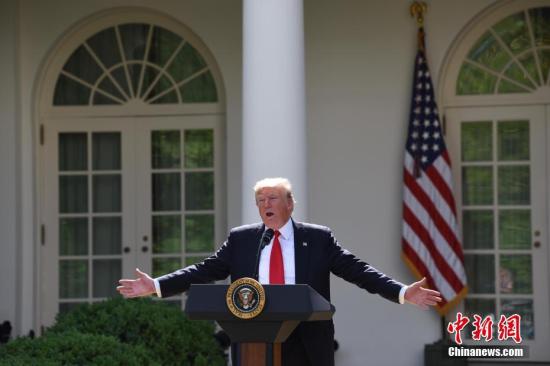Confusion surrounds Trump’s DACA decision
- By Jesse Anderson
 0 Comment(s)
0 Comment(s) Print
Print E-mail China.org.cn, September 14, 2017
E-mail China.org.cn, September 14, 2017
 |
|
U.S.President Donald Trump [Chinanews.com] |
The topic of immigration has become increasingly prominent in Western countries in recent years. Europe, of course, has taken in hundreds of thousands of migrants since the outbreak of the ongoing conflict in Syria -- many of whom aren’t, in fact, Syrian -- raising questions as to its ability to integrate huge numbers of people from non-Western, developing countries.
In the U.S., meanwhile, the longstanding debate over immigration from Latin America has intensified since Donald Trump was elected President and his proposed wall along the Mexican border was suddenly transformed from something of a joke into a potential reality.
However, the latest development in the immigration debate is Trump’s cancellation of DACA (Deferred Action for Childhood Arrivals), something he’d promised to do during his presidential campaign.
DACA, and the motives behind it, underwent a somewhat lengthy gestation period, but the most important fact is that it became effective through an executive order (i.e., when the President acts alone, without approval from the legislative or judicial branches) signed by Barack Obama in 2012.
The policy essentially made illegal immigrants who had arrived in the U.S. before the age of 16 (there were also several other criteria, e.g., they had to either have graduated, or be enrolled in, high school) eligible for a renewable two-year work permit.
In 2014, Obama announced his intention to create a similar program (known as DAPA) for illegal immigrants who were parents of U.S. citizens or permanent residents, but the policy stalled when several states filed lawsuits claiming it was an overreach of presidential authority.
Reactions to Trump’s cancellation of DACA have been interesting. There are, as would expected, many on the left who’ve called his move racist, xenophobic, anti-American, etc. And, likewise, there are many people on the right who have applauded it for its perceived toughness on illegal immigration.
However, things are actually a bit more complicated than that.
One of the most controversial aspects is a claim that DACA is unconstitutional: Similar to how the passage of DAPA was prevented due to accusations of executive branch overreach, there may be a legitimate claim that DACA was never really legal in the first place.
And, indeed, this has been, at least publicly, Trump’s reasoning behind his cancellation of the program. Here is a Tweet Trump sent out on Sept. 5: “Congress now has six months to legalize DACA (something the Obama administration was unable to do). If they can’t, I will revisit the issue!”
And, speaking at a press conference following the decision, he said the following regarding the migrants directly affected by DACA: “I have a love for these people, and, hopefully, now, Congress will be able to help them and do it properly.”
So, the implication is that Trump isn’t actually against DACA as a policy. Instead he’s against the way it was brought into being and hopes that Congress can create a more legitimate, legislative branch -- approved form of DACA, one that’s not based solely on a controversial executive order -- although his Tweet does make it sound as if he may be willing to bring DACA back through an executive order if Congress fails to make headway.
What are we to believe? What is Trump really thinking? One theory is that he is basically trying to absolve himself of any responsibility with regards to DACA. By cancelling Obama’s original executive order, he can claim that he’s followed through on his campaign promise, while by encouraging Congress to bring back DACA, he can shield himself from accusations of anti-immigrant sentiments from the left.
Yet, does he actually want Congress to pass a more long-term DACA bill? An important thing to consider is the fact that many Republican congressmen would be voting against their constituents’ desires if they voted to reinstate DACA, thus making it harder for them to get reelected. As with most things Trump-related, the DACA issue is highly convoluted, and, in addition to questioning what Trump’s motivations are, one has to wonder if Trump even knows what he wants.
There are currently about 800,000 people living in the U.S. under the DACA program, and this is naturally a very stressful time for them. Many have spent the majority of their lives in America and know very little about their “home” country. It’s shame they now found their futures wrapped up in the President’s twisted political machinations.
Jesse Anderson is a writer and translator originally from Seattle. He is currently based in Mexico City.
Opinion articles reflect the views of their authors, not necessarily those of China.org.cn.






Go to Forum >>0 Comment(s)